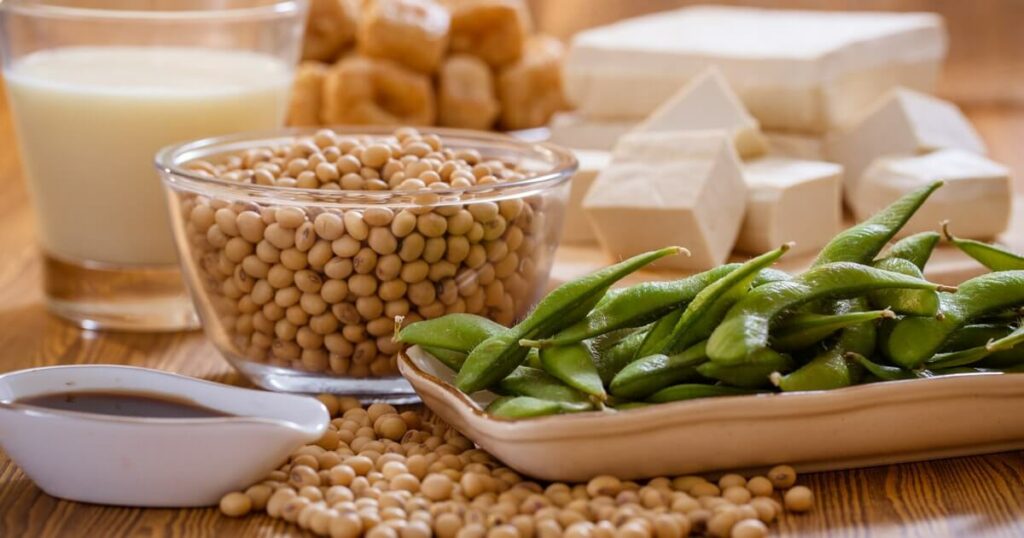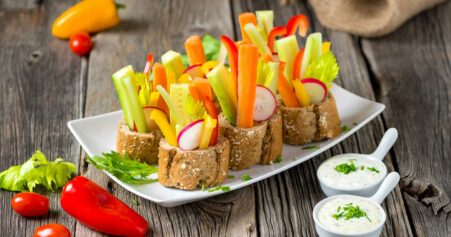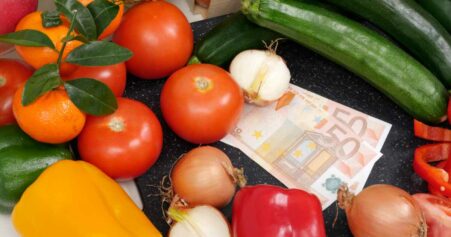Table of Contents
Soy is often considered an important part of a vegan diet. But uncertainty about the health effects of soy and soy products is growing. This is not surprising given the conflicting opinions, mass cultivation, and genetic engineering. However, the Southeast Asian populations we know of have shown for centuries that regular consumption of soy is not associated with the occurrence of the diseases of civilization that are so prevalent in other parts of the world. But what about the scientific facts about the legume? Should we completely eliminate soy and soy products such as tofu, tempeh and soy drinks from the diet? Or is soy healthy, or can the bean enrich diet and health? Let’s take a closer look at these questions.
Soybean: Origin and Sustainability
From a global perspective, soybean is an optimal nutrient source due to its high protein content and undemanding growing conditions, while being highly profitable. Soybean production has increased tenfold in the last 50 years; in South America, 123 % more soybean was produced in 2004 than in 1996 (WWF, 2014). Globally important ecosystems are being forced to succumb to this scale, with devastating consequences: Natural forests, savannahs, and grasslands are threatened by the loss of habitat for countless species of animals, the loss of an important reservoir of carbon dioxide, the infertility of soils, and the disruption of the rainforest’s natural water cycle. The extensive use of transgenic seeds has also been criticized. Transgenic seeds are seeds in which foreign genes are introduced into the genetic material of the soybean plant, primarily to make it more resistant and to achieve other profitable traits.
Only 13 % of the world’s soybean crop goes to direct food consumption, with Asian populations being the main consumers. The largest share, about 70 % of global soy production, goes to the animal feed industry, which is linked to the increasing meat production in industrialized countries. A small portion is processed into soybean oil, which is used not only as food but also in cosmetic products and for the production of biodiesel (Bundesanstalt für Landwirtschaft, Forsten und Fischerei, 2016). The legume is also cultivated in central European latitudes, with France and Austria far ahead in production (Bernet et al., 2016). Organic soy products are not genetically modified.
Is Soy Unhealthy? Answers from Nutritional Sciences
 As you can see from Table 1, the soybean is characterized by a high protein content of about 38 %. It has a high protein quality and quite a favorable fatty acid spectrum. Compared to most other beans, its fat content is relatively high (BLS) at just under 40 % of the energy content (18 g/100 g). On the other hand, it has a high content of polyunsaturated fatty acids of the omega-6 and omega-3 groups (about 60 %), as well as a significant amount of oleic acid, a valuable monounsaturated fatty acid with positive health effects on cholesterol levels. In contrast, the amount of the more undesirable saturated fatty acids is relatively low. For this reason, high-heat soybean oil is considered to be of high nutritional value (Mateos-Aparicio et al., 2008).
As you can see from Table 1, the soybean is characterized by a high protein content of about 38 %. It has a high protein quality and quite a favorable fatty acid spectrum. Compared to most other beans, its fat content is relatively high (BLS) at just under 40 % of the energy content (18 g/100 g). On the other hand, it has a high content of polyunsaturated fatty acids of the omega-6 and omega-3 groups (about 60 %), as well as a significant amount of oleic acid, a valuable monounsaturated fatty acid with positive health effects on cholesterol levels. In contrast, the amount of the more undesirable saturated fatty acids is relatively low. For this reason, high-heat soybean oil is considered to be of high nutritional value (Mateos-Aparicio et al., 2008).
Table 1: Average Nutrient Content per 100 g (German Nutrient Database)
| Energy | 386 kcal |
| Protein | 38 g |
| Fat | 18 g |
| Carbohydrates | 6 g |
| Fiber | 22 g |
| Calcium | 200 mg |
| Iron | 6606 µg |
| Zinc | 4192 µg |
| Folic Acid | 250 µg |
Soybean is a good source of micronutrients, such as iron, potassium and calcium. The bioavailability of iron from legumes is not very high, but can be improved combining it with vitamin C-containing products. The bioavailability of zinc in soybeans is quite good with about 25 % (Messina, 1999). In addition, it provides a wide range of B vitamins, vitamin C and a certain amount of fiber; some facts that make soy look healthy (BLS).
Secondary Phytochemicals
Like all plants, soybeans contain certain phytochemicals. Many people are familiar with the term phytoestrogens or isoflavones in the context of hypothetical adverse health effects related to breast cancer. These isoflavones are molecules that are structurally related to the endogenous sex hormone estrogen. Accordingly, they can bind to the estrogen receptor and exert either agonistic or antagonistic effects. However, some caveats: First, isoflavones are bound to sugar molecules from which they must first be separated, and ultimately only a small fraction enters our metabolism. Second, their effect is minimal compared to endogenous estrogen. Compared to the body’s own hormone, they bind more strongly to the ß-estrogen receptor, causing estrogen-like effects in some tissues but not in others. The breast cancer drug tamoxifen has a similar effect (Wu et al., 2007).
Studies suggesting adverse effects are mainly based on in vitro studies using cell cultures in a petri dish inoculated with isolated phytoestrogens. These results cannot simply be transferred to the human digestive and metabolic systems, nor to the consumption of whole foods such as soy or tofu (Barrett, 2006).
Soy and Disease![Sojagranulat]()
Research shows that moderate consumption of minimally processed soy products, that means one to two servings per day, can reduce the risk of prostate cancer and cardiovascular disease (Zhang et al., 2017; Ju Y., 2016; Zhang et al., 2016; Messina and Messina, 2010). In this context, one serving is equivalent to approximately 100 g of tofu, 250 ml of soy milk, or 20 g of soy nuts (AICR, 2019). In addition, the scientific evidence tends to support a protective effect of regular soy consumption in relation to breast cancer, which is attributed to the mechanism described above. Some organizations do not recommend regular intake of isolated isoflavone supplements, especially for breast cancer patients (Ju Y., 2016). However, studies suggest that soy consumption may even have a positive effect on existing breast cancer, and breast cancer patients may be advised to take soy isoflavone supplements (Mörixbauer, 2019). In addition, there is evidence that isoflavones in soy may alleviate menopausal and premenstrual symptoms (Mörixbauer, 2019), and soy protein can have a beneficial effect on blood lipid levels (Mejia, 2019).
Epidemiologic studies comparing Asian and Western populations show a link between regular soy consumption and lower rates of cardiovascular disease and cancer. However, when Asians migrate to the West, their risk of disease also increases as a result of adapting their dietary habits, and thus it cannot be attributed to genetic predisposition (Barrett, 2006).
Hormonal Effects in Men?
Another myth that has emerged is the feminization of men with regular consumption of soy. Here again, the scientific data show that this is not the case: Moderate soy consumption and therefore intake of isoflavones does not increase estrogen levels, does not seem to decrease testosterone levels, and may even improve male infertility by harmonizing hormonal imbalances. Feminizing effects and undesirable effects on hormone levels have only been shown in animal studies by administration of high doses of phytoestrogens (Messina and Messina, 2010; Mínguez-Alarcón, 2015).
Soy in the Vegan Diet: Is it Unhealthy?
The consumption of soy (products) can make a valuable contribution to the vegan diet. Due to the good amino acid and fatty acid spectrum, as well as important micronutrients and secondary plant compounds, the soybean in its natural form, as well as the minimally processed tofu or tempeh, is considered a high-quality food. The initial question of whether soy is unhealthy can be answered in short with a “No”, and by pointing to the beneficial health effects that have been shown in scientific studies.
But it does not always have to be soy: Lupine, for example, is a good alternative (or addition). From a nutritional point of view, this legume with its beneficial substances is just as recommendable. But also from an ecological point of view, environmentally harmful production methods can be avoided by buying and eating locally grown lupine. Even if the other legumes (peas, beans, lentils) do not have the same high protein quality as soy, a varied intake of all these foods guarantees a good nutrient intake.










Leave a Reply